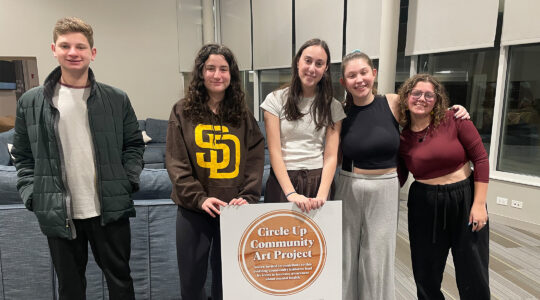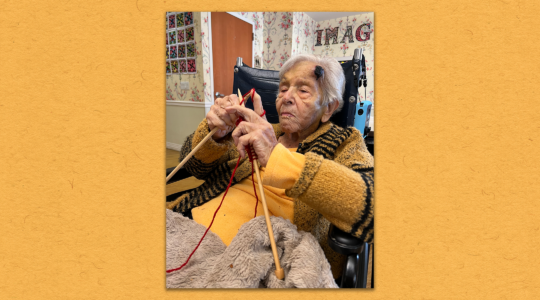Getting your Trinity Audio player ready...

A timeline of the Rev. Dr. Martin Luther King Jr.’s relationship with the Jewish community in the 1960s in the JTA Archive, including the immediate aftermath of his death:
-
- Jul. 16, 1961: At closing of European Study Conference in 1961, executive director of the United Synagogue of America dubs King and Gandhi “followers of the ancient Jewish tradition.”
- Sept. 30, 1962: A member of George Rockwell’s American Nazi party — previously involved in anti-Semitic disturbances — convicted of punching and beating MLK at a meeting of the integrationist Southern Christian Leadership Conference.
- Feb. 5, 1963: Dr. King kicks off the American Jewish Committee’s annual campaign, with an address, underscoring the “centuries-long common struggle of Negroes and Jews, not only to rid our selves of bondage but to make oppression of any people by others an impossibility.”
- May 8, 1963: Rabbi Bernard Mandelbaum, Jewish Theological Seminary provost, asks 400 rabbis how they could be concerned “only with Nazi cruelty when acts of injustice to fellow human beings were taking place in our country.” With encouragement from King’s brother, 20 Conservative rabbis fly from New York to Birmingham, Alabama.
- May 14, 1963: Reform temple in Toronto announces drive to raise funds to assist MLK in Birmingham, “conditional upon the Negroes not resorting to violence and mob action.”
- Oct. 13, 1963: King co-sponsors conference on Soviet Jewry at the Carnegie International Center in New York City.
- Nov. 19, 1963: United Synagogue honors Dr. King with award in New York while simultaneously celebrating the organization’s 50th anniversary and the Emancipation Proclamation’s centenary. King lashes out at Soviet government for its “attempt to liquidate the Jewish people in Soviet Russia.” Two days later in Chicago, he urges the Union of American Hebrew Congregations to organize on behalf of civil rights legislation.
- Jun. 7, 1964: Jewish Theological Seminary awards King with an honorary degree along with Rabbi Bernard Segal, among others.
- June 17-19, 1964: At the request of Dr. King, twenty reform rabbis travel to join St. Augustine riots; fifteen are arrested while led in prayer by the Rev. Fred Shuttlesworth.
- Aug. 11, 1964: Responding to JTA reports about summer race riots in Rochester and New York City, Dr. King releases a statement to the Atlanta Southern Israelite. “I am particularly pained to learn that a large percentage of the looted stores were owned by our Jewish friends,” states King, “since, as a group, the Jewish citizens of the United States have always stood for freedom, justice, and an end to bigotry.” King also references the deaths of two Jewish activists in Meridian M.S.
- Jan. 16, 1965: The New York Times publishes a letter by Dr. King urging Moscow to change policy on Jews.
- Mar. 4, 1965: UJA Federation of New York women honor Dr. King with award at launch of annual campaign.
- Mar. 7, 1965: 600 civil rights marchers set out from Selma to Montgomery, Alabama, attacked by police in an event called “Bloody Sunday.” Over the next several days, Jewish organizations protest to President Lyndon B. Johnson over police brutality. Jacob T. Zuckerman, president of the Workmen’s Circle, calls for steps to be taken to indict Governor George Wallace. Dr. Joachim Prinz telegrams President Johnson, lauding him “for noting that the ‘real issue in Selma is not the demonstrations but rather their underlying cause–the systematic denial to Negro citizens of the most basic democratic right of all, the right to participate in the processes of Government.'”
- Mar. 21-25, 1965: In the second march from Selma, theologian Dr. Abraham Joshua Heschel marches at the front of the line at the invitation of Dr. King. The following day, JTA reports, “Hundreds of Negro freedom marchers today wore yarmulkes (skullcaps), in respectful emulation of rabbis who participated in demonstrations in Alabama as Jewish participation in the march from Selma to Montgomery.” Several other rabbis representing several denominations participate, as well.
- Mar. 29, 1965: At the biennial convention of the National Council of Jewish Women, New York Senator Jacob Javits urges Jews “to help Negroes get the same rights for which their own parents and grandparents had come to the United States.” Javits and Whitney M. Young, Jr., executive director of the National Urban League, both express reservations over King’s proposed boycott of Alabama products.
- May 20, 1965: At the American Jewish Committee annual conference, Dr. King suggests, “Perhaps if there had been a broader understanding of the uses of non-violent direct action in Germany when Hitler was rising and consolidating his power, the brutal extermination of 6,000,000 Jews and millions of other war dead might have been averted and Germany might never have become totalitarian.”
- Jun. 9, 1965: Unable to attend rally for Soviet Jewry, King writes in with a message of support: “We in the civil rights movement have repeatedly made clear our commitment to the freedom of all men regardless of color, race, or creed. In light of this principle, we deplore anti-Semitism as we deplore discrimination and segregation in Mississippi and Alabama.”
- Sept. 16, 1965: King is one of three Nobel Prize winners to sign petition in support of Soviet Jewry.
- Mar. 22, 1966: Israeli human rights activist Abie Nathan accepts invitation to speak at Vietnam War protest rally under the mistaken belief that Dr. King and Senator William J. Fulbright would be among the speakers.
- Jul. 25, 1966: The New York Times reports that Dr. King’s Southern Christian Leadership Conference has reported a significant decrease in funding from White liberals, citing that many civil rights groups are losing funding over a perceived increase in anti-Semitism and “black racism.”
- Aug. 21, 1966: King and 500 protest marchers in Chicago jeered with swastikas; American Nazi party leader George Rockwell speaks for 40 minutes, charging “that ‘Jewish money’ was financincing Negro civil rights demonstrations.” Rockwell was subsequently denied a permit to hold a rally the following weekend, when King was slated for a march in another neighborhood.
- Dec. 11, 1966: In a march and rally for Soviet Jewry at Cooper Union Hall in New York City, MLK calls in from Atlanta. “He said that while Jews in Russia are not being killed as in Nazi Germany, they are ‘facing every day a kind of spiritual and cultural genocide,'” JTA reported.
- Jan. 8, 1967: A Florida physician continues a series of right-wing phone messages called “Let Freedom Ring,” which had previously taken aim at several targets, including Dr. King, now leaves messages accusing the Weizman Institute of smuggling LSD into the country as part of a Communist conspiracy.
- Apr. 6, 1967: Jewish War Veterans of the U.S.A. takes issue with MLK’s likening the use of new weapons in Vietnam to the Nazi experimentation with new medicines and tortures on concentration camp inmates.
- May 27, 1967: As Egyptian president Gamal Abdel Nasser threatens closure of the Strait of Tiran, King is one of eight prominent Christian clergymen to sign statement urging support of Israel.
- Aug. 16, 1967: Actor Theodore Bikel resigns from Student Nonviolent Coordinating Committee over the organization’s continued written and verbal attacks against Zionism, Israel and Jews. Author Harry Golden resigns the following week. King state he is unaware of the remarks in question but reaffirms his opposition to antisemitism. Despite opposition to his appearance, King addresses 1,500 people two weeks later in the predominately Jewish vacation resort community of Fire Island, asserting “there is virtually no anti-Semitism within the Negro community.”
- Oct. 10, 1967: Addressing Jewish concerns over the anti-Israel position adopted at the New Politics Convention in Chicago in Sept., MLK denounces black separatism and anti-Semitism. “Israel’s right to exist as a state in security is incontestable,” reads King’s statement. “At the same time the great powers have the obligation to recognize that the Arab world is in a state of imposed poverty and backwardness that must threaten peace and harmony. Until a concerted and democratic program of assistance is affected, tensions cannot be relieved. Neither Israel nor its neighbors can live in peace without an underlying basis of economic and social development.”
- Nov. 12, 1967: UAHC General Assembly in Montreal calls on American Jewry “not to use Negro anti-Semitism ‘as a cop-out from the civil rights movement.'” A five-point program promoting racial equality and justice includes exertion of moral pressure by rabbis and congregants against Jewish “slumlords and ghetto profiteers,” as well as “intensification of programs like ‘operation suburbia’ in which suburban families take Negro children into their homes for weekend visits.”
- Mar. 18, 1968: The Jewish Community Council of Greater Washington and the Commission on Social Action of Reform Judaism vote approval of Rev. Martin Luther King’s “poor people’s campaign,” scheduled for April 22. The JCC of Greater Washington distributes the resolution to member organizations on Mar. 31.
- Mar. 27, 1968: At the annual convention of the Conservative movement’s Rabbinical Assembly, King characterizes anti-Semitism in the “Negro community” as “almost completely an urban ghetto phenomenon and virtually non-existent in the South,” owing to the two distinct encounters Jews have with the community as landowners and “owner of the store around the corner where the ghetto-dweller pays more for less” on one hand, and as civil rights movement allies on the other. King also asserts his vision for peace in the Middle East as requiring some sort of “Marshall Plan.”
- Apr. 4, 1968: Martin Luther King Jr. assassinated in Memphis. American Jewish leaders join in mourning the civil rights leader, as do leading figures in Israel and even France. Race riots erupt in major cities across the country, with Jews enduring substantial property damage to homes and businesses in Kansas City, Pittsburgh, Baltimore and Washington, D.C.
- Apr. 9, 1968: Martin Luther King, Jr. laid to rest. 700 Jewish schools and several Jewish organizations in New York closed in a sign of respect.
Keep Jewish Stories in Focus.
JTA has documented Jewish history in real-time for over a century. Keep our journalism strong by joining us in supporting independent, award-winning reporting.





